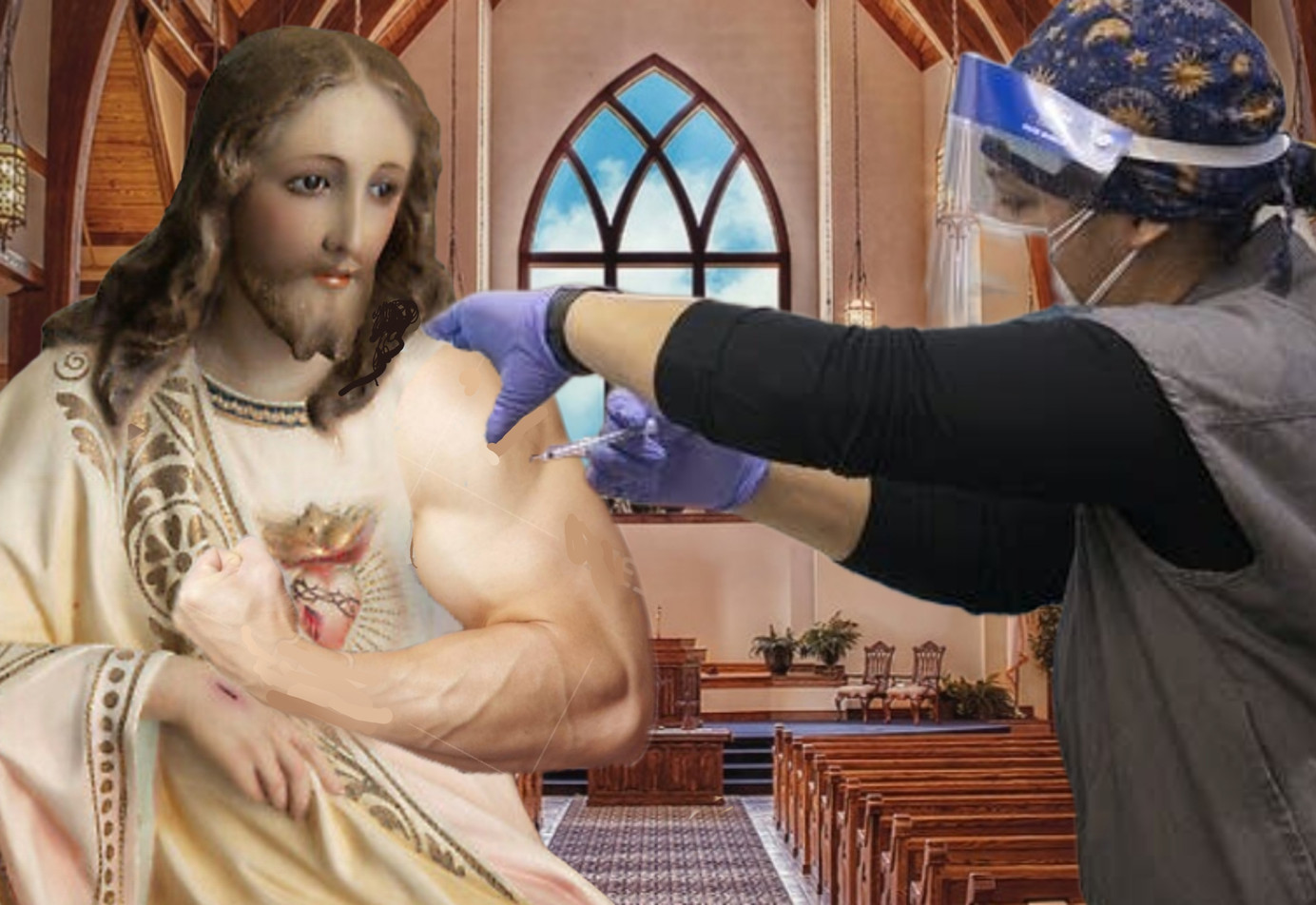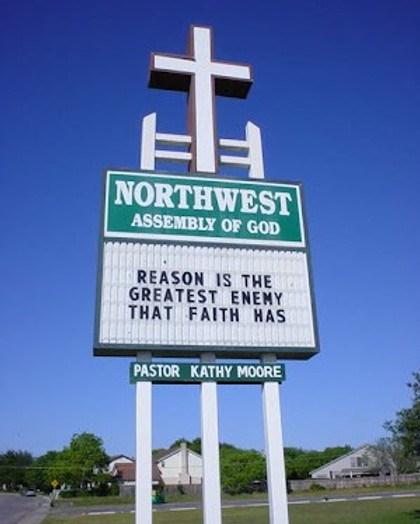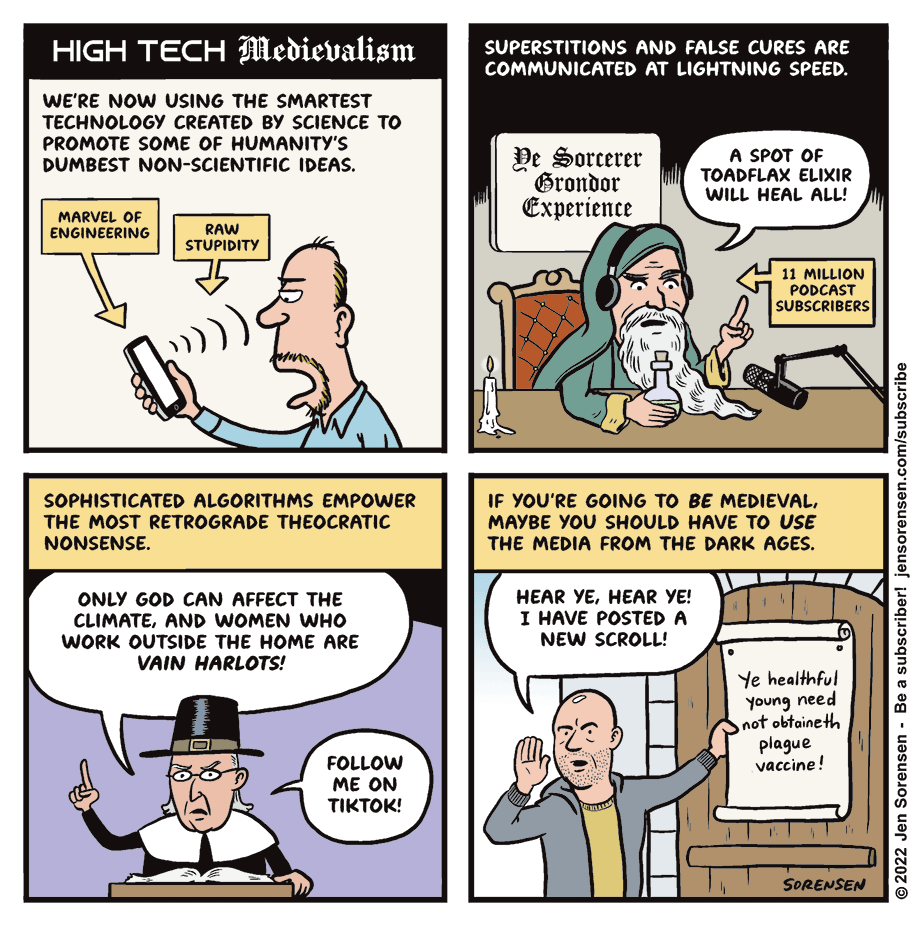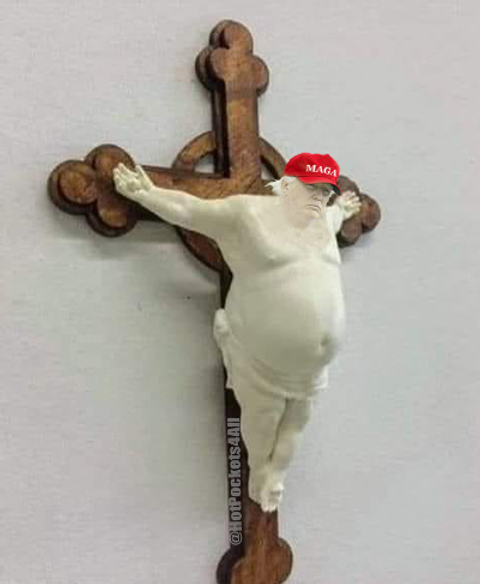A Christmas Sermon on Peace
Martin Luther King, 1967 [excerpt]
It really boils down to this: that all life is interrelated. We are all caught in an inescapable network of mutuality, tied into a single garment of destiny. Whatever affects one directly, affects all indirectly. We are made to live together because of the interrelated structure of reality. Did you ever stop to think that you can't leave for your job in the morning without being dependent on most of the world? You get up in the morning and go to the bathroom and reach over for the sponge, and that's handed to you by a Pacific islander. You reach for a bar of soap, and that's given to you at the hands of a Frenchman. And then you go into the kitchen to drink your coffee for the morning, and that's poured into your cup by a South American. And maybe you want tea: that's poured into your cup by a Chinese. Or maybe you're desirous of having cocoa for breakfast, and that's poured into your cup by a West African. And then you reach over for your toast, and that's given to you at the hands of an English-speaking farmer, not to mention the baker. And before you finish eating breakfast in the morning, you've depended on more than half the world. This is the way our universe is structured, this is its interrelated quality. We aren't going to have peace on Earth until we recognize this basic fact of the interrelated structure of all reality. ....
It's one of the strangest things that all the great military geniuses of the world have talked about peace. The conquerors of old who came killing in pursuit of peace, Alexander, Julius Caesar, Charlemagne, and Napoleon, were akin in seeking a peaceful world order. If you will read Mein Kampf closely enough, you will discover that Hitler contended that everything he did in Germany was for peace. And the leaders of the world today talk eloquently about peace. Every time we drop our bombs in North Vietnam, President Johnson talks eloquently about peace. What is the problem? They are talking about peace as a distant goal, as an end we seek, but one day we must come to see that peace is not merely a distant goal we seek, but that it is a means by which we arrive at that goal. We must pursue peaceful ends through peaceful means. All of this is saying that, in the final analysis, means and ends must cohere because the end is preexistent in the means, and ultimately destructive means cannot bring about constructive ends.
Christmas 2023: Baby Jesus is under the rubble of Gaza
www.democracynow.org/2023/12/22/christmas_cancelled_in_palestine_mitri_raheb
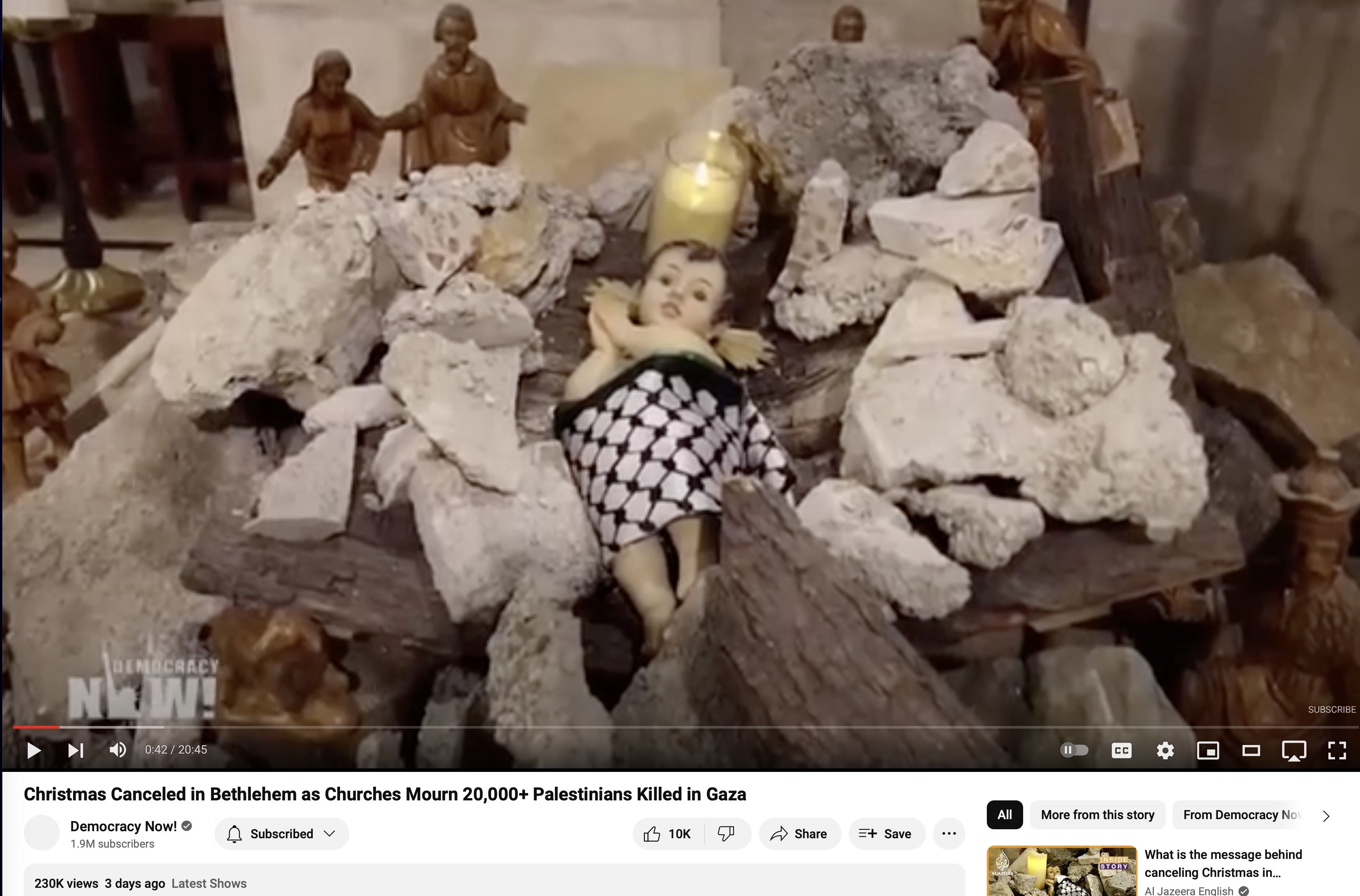
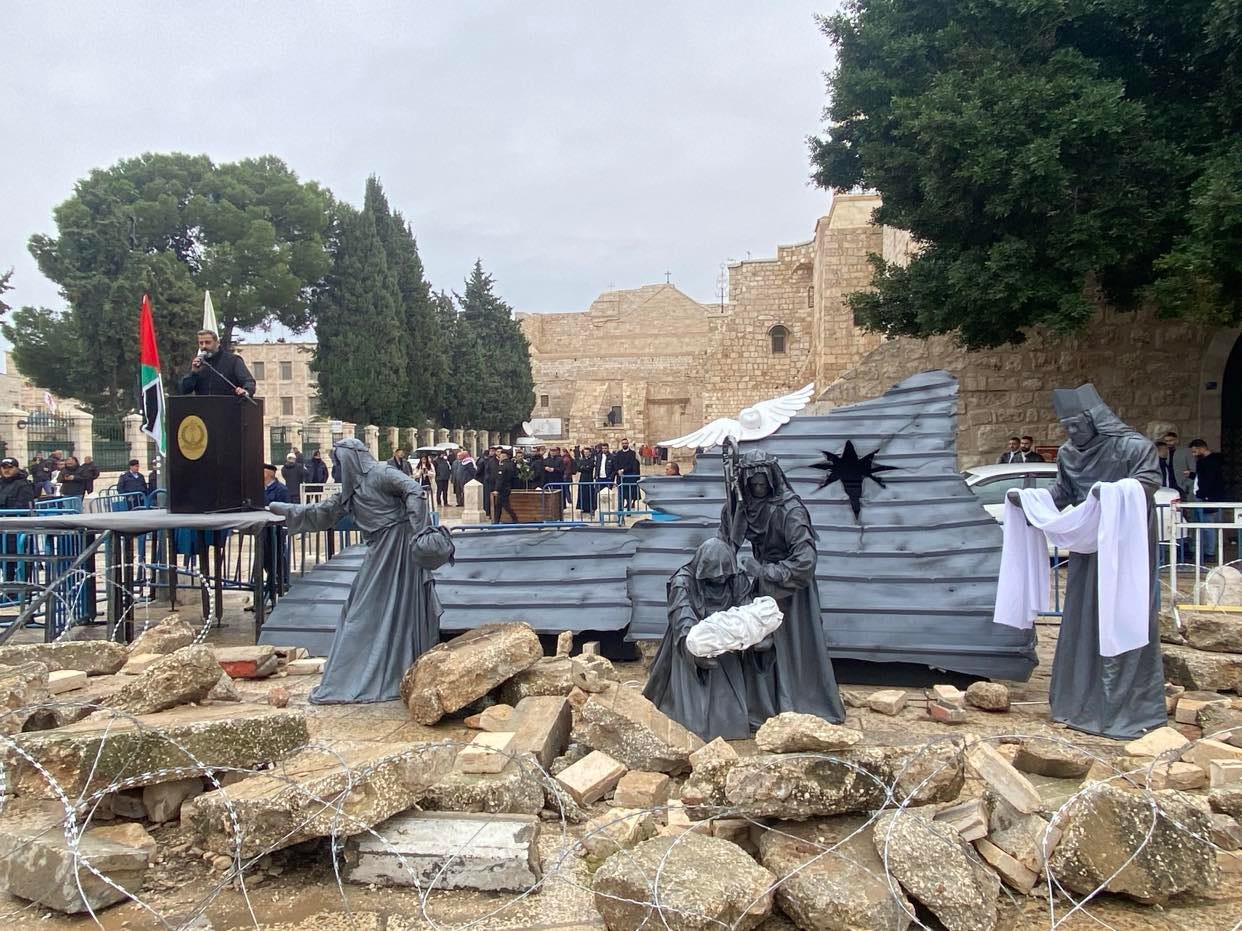

from The Guardian

Vatican City: "the only true jubilee - cease fire"
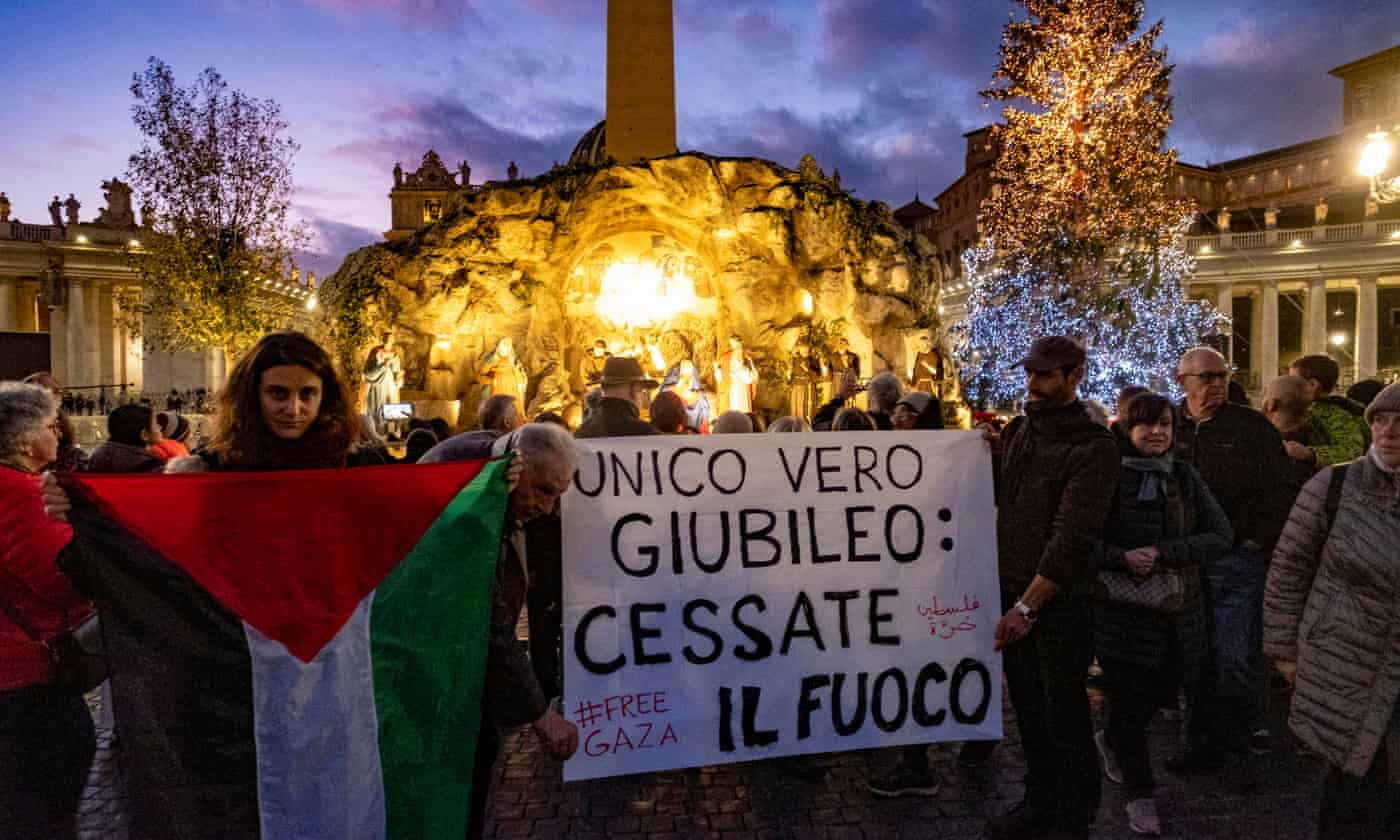
NORAD tracks Santa every Christmas eve:
making nuclear war preparation cute for kids.
Believing in nuclear war is worse than believing in Santa.
my favorite Christmas movies
- Monty Python's Life of Brian
- Brazil
 |
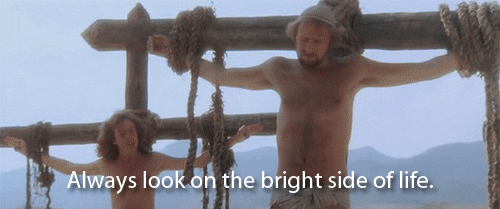 Monty Python's The Life of Brian Monty Python and the Holy Grail  |
the exact spot where He came out of Mary
In 1974, when I was 10, my family had a once in a lifetime vacation to Israel. Muslims are obligated to visit Mecca once in their lives (which was more difficult in the days before globalized aviation). There is no formal Biblical requirement for American Jews to visit Israel, but it's encouraged, and we spent three weeks on a grand tour.
One of the sites we visited was the Church of the Nativity in Bethlehem (in the occupied West Bank, but I didn't understand occupation then). In the Church there is a circle marking the exact spot where Jesus came out of Mary. Seeing that confirmed my suspicions about religion (all brands, not just Christianity).
The official story of the birth of Jesus is it was in a manger, since Mary and Joseph were homeless (and unwed) at the time. The church was built centuries after this event supposedly happened. I realized this was all made up out of manger dung. I might believe a plaque stating that this event took place in the general vicinity, but not that we know this happened at an exact spot.
The Church of the Naivete. Metaphors be with you.
https://en.wikipedia.org/wiki/Church_of_the_Nativity#/media/File:Nativity_Grotto_Star.jpg

Albert Einstein:
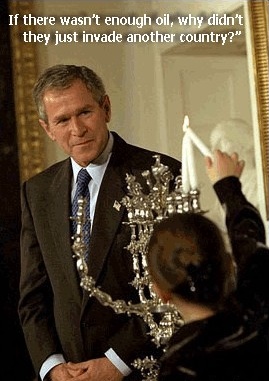 "The word God is for me nothing more than the expression and product of human weakness, the Bible a collection of honorable, but still purely primitive, legends which are nevertheless pretty childish. No interpretation, no matter how subtle, can change this for me. For me the Jewish religion like all other religions is an incarnation of the most childish superstition. And the Jewish people to whom I gladly belong, and whose thinking I have a deep affinity for, have no different quality for me than all other people. As far as my experience goes, they are also no better than other human groups, although they are protected from the worst cancers by a lack of power. Otherwise I cannot see anything "chosen" about them."
"The word God is for me nothing more than the expression and product of human weakness, the Bible a collection of honorable, but still purely primitive, legends which are nevertheless pretty childish. No interpretation, no matter how subtle, can change this for me. For me the Jewish religion like all other religions is an incarnation of the most childish superstition. And the Jewish people to whom I gladly belong, and whose thinking I have a deep affinity for, have no different quality for me than all other people. As far as my experience goes, they are also no better than other human groups, although they are protected from the worst cancers by a lack of power. Otherwise I cannot see anything "chosen" about them."
Princeton, 3. 1. 1954
Dear Mr Gutkind,
In January of 1954, just a year before his death, Albert Einstein wrote the following letter to philosopher Erik Gutkind after reading his book, "Choose Life: The Biblical Call to Revolt," and made known his views on religion.
http://www.webcitation.org/651nnfKDv
"[N]o religious test shall ever be required as a qualification to any office or public trust under the United States."
-- Article VI, paragraph 3, United States Constitution
 "I have examined all the known superstitions of the word, and I do not find in our particular superstition of Christianity one redeeming feature. They are all alike founded on fables and mythology. Millions of innocent men, women and children, since the introduction of Christianity, have been burnt, tortured, fined and imprisoned. What has been the effect of this coercion? To make one half the world fools and the other half hypocrites; to support roguery and error all over the earth."
"I have examined all the known superstitions of the word, and I do not find in our particular superstition of Christianity one redeeming feature. They are all alike founded on fables and mythology. Millions of innocent men, women and children, since the introduction of Christianity, have been burnt, tortured, fined and imprisoned. What has been the effect of this coercion? To make one half the world fools and the other half hypocrites; to support roguery and error all over the earth."
– Thomas Jefferson
"What influence in fact have Christian ecclesiastical establishments had on civil society? In many instances they have been upholding the thrones of political tyranny. In no instance have they been seen as the guardians of the liberties of the people. Rulers who wished to subvert the public liberty have found in the clergy convenient auxiliaries. A just government, instituted to secure and perpetuate liberty, does not need the clergy."
— James Madison
"A firehouse is more useful than a church."
— Benjamin Franklin

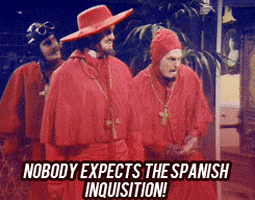
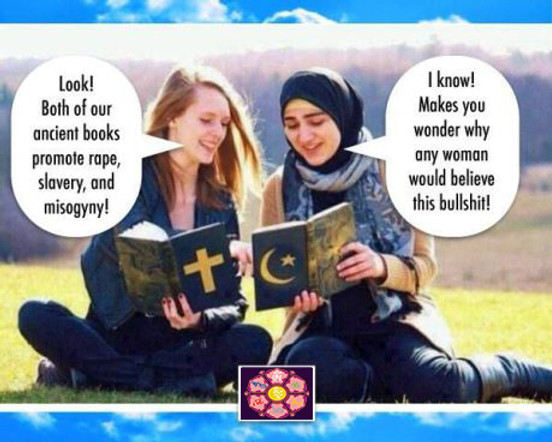
Dar Williams - The Christians and the Pagans
www.youtube.com/watch?v=7vggo_9EDZU
Covid Christmas
www.sorryantivaxxer.com/post/mike-santa-claus-anderson-68-north-pole-staunch-conservative-and-anti-vaxxer-dead-from-covid
www.complex.com/life/santa-shortage-335-santas-died-covid-related 

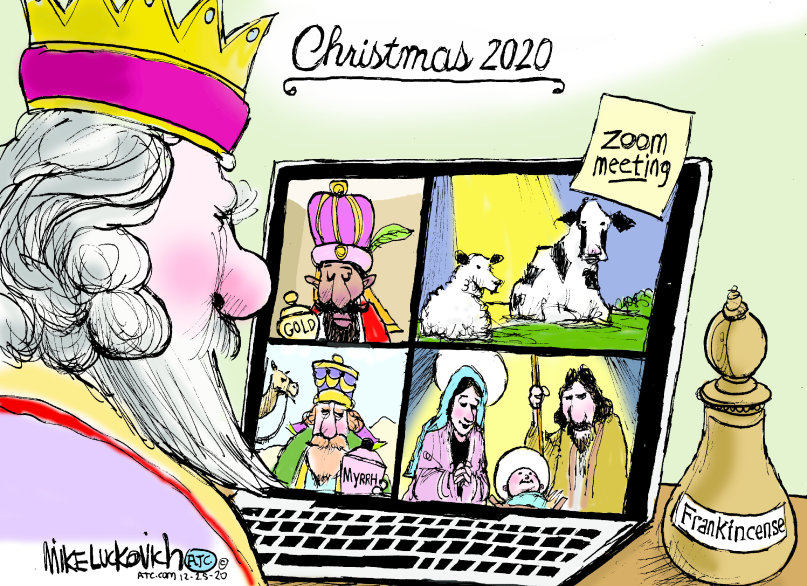


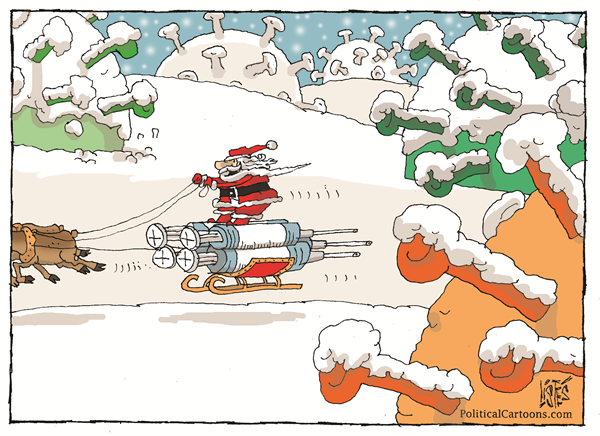



"Jesus is supposed to die for you, not the way around"
- Trevor Noah
https://www.youtube.com/watch?v=g1NWmnrXufs
